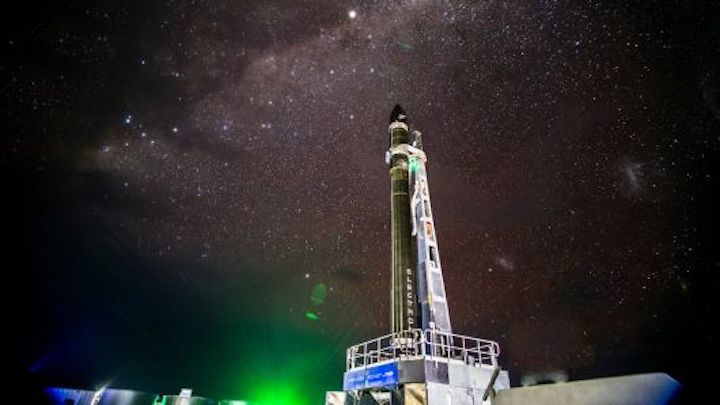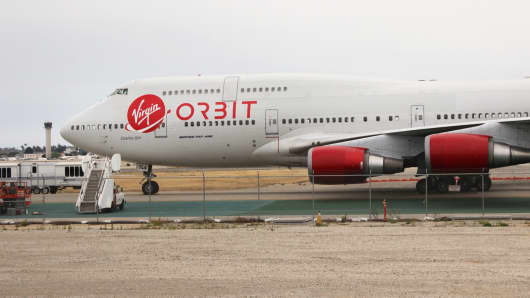6.08.2018

Rocket Lab's Electron sits on on the company's launch pad in New Zealand before its first commercial launch.
- A host of U.S. companies signed partnerships with the United Kingdom Space Agency.
- Lockheed Martin won the bulk of the UKSA funding, getting about $30 million.
- Virgin Orbit sealed a partnership with Spaceport Cornwall to launch by 2021.
A host of U.S. companies signed partnerships with the United Kingdom Space Agency (UKSA) in July, with several more waiting in the wings, as the British government doled out funding for launching commercial rockets from the island for the first time ever.
The U.K. manufactures more small satellites than anywhere else in the world, owning 6.5 percent of the $384 billion space economy. The U.K. currently produces about 44 percent of the world's small satellites, and has extensive facilities to operate those satellites once active.
The UKSA intends to grow its stake in the market to 10 percent by 2030, which will likely be worth more than $109 billion at the time, according to Bank of America estimates. To achieve that growth, UKSA is working to attract rocket companies that specialize in launching small satellites.
"Money is actually being allocated to specific places for the first time," Bleddyn Bowen, a space policy expert at the University of Leicester, told CNBC. “The government and the various parts of the space sector have been talking about this for 10 years.”
Lockheed Martin won the bulk of the UKSA funding, getting more than $30 million to develop an orbital launch site for small rockets in Melness, Scotland, in partnership with the economic development agency Highlands & Islands Enterprise.
A senior UKSA official with knowledge of the agreement told CNBC that Lockheed Martin offered to both develop a spaceport and "bring a kind of tried and tested system that was flight ready.”
Britain "doesn't have a really deep supply chain for launch vehicles," the official said, explaining how the U.K's upcoming investment would put the entire supply chain for launching satellites on home soil.
Patrick Wood, Lockheed Martin's UK space executive, said in a statement to CNBC that the company "is continuing detailed discussions with our commercial launch provider and will have an update soon. The launcher will be a flight-proven, dedicated small sat vehicle."
While Lockheed Martin did not specify which rocket company it would bring in, the criteria fits very few in the growing sub-industry of rockets tailored to launch for small satellites. Rocket Lab, which counts Lockheed Martin among its investors, reached orbit with its Electron rocket for the first time in January, making the company a strong possibility.
"While we do not have additional details to share at this time, we recognize that Rocket Lab’s Electron is a capable commercial launch platform," Wood said.
Rocket Lab confirmed that it is evaluating the opportunity to launch from the Melness spaceport, noting the previous investment it received from Lockheed Martin.
"Electron is well-positioned to be the first orbital rocket launched from U.K. soil," Rocket Lab CEO Peter Beck said in a statement. "We’re excited to review the opportunity to develop a launch service to support the U.K.’s space industry’s growth.”
The young rocket-builder also noted that it will select a U.S. launch site next month. Rocket Lab has chosen four spaceports in the U.S. as final candidates – Cape Canaveral Air Force Station in Florida, Wallops in Virginia, the Pacific Spaceport Complex in Alaska and Vandenberg Air Force Base in California.
A U.S. location would be Rocket Lab's second launch site, with a first mission scheduled for the second quarter of next year, while a U.K. location would likely be the third.
Lockheed Martin's grant will also go toward the development of a new system for deploying small satellites, with U.K.-based Orbital Micro Systems developing the testing hardware, and U.S.-based Moog building the vehicle that will place the small satellites in orbit.
As the contract includes establishing a vertical launch facility at Melness, Lockheed Martin says it will bring experience to the process that's necessary to build a rocket range. The contractor has worked on the infrastructure for several U.S. facilities in the past, including the support of launch operations for California's Vandenberg Air Force Base, and Florida's Cape Canaveral Air Force Station.
Virgin returns to home soil
Among three space companies owned by British billionaire Richard Branson is Virgin Orbit, based in Long Beach, California. The company aims to use a modified Boeing 747 airplane named "Cosmic Girl" to launch satellites on small rockets, and expects to attempt an orbital launch later this year.
Virgin Orbit sealed a deal with the UKSA to launch its LauncherOne rocket from Cosmic Girl, taking off from a spaceport at Newquay Airport in Cornwall, southwest England. The partnership with Spaceport Cornwall expects to launch its first rocket by 2021, which would be the first to ever conduct commercial flights to space from British soil.
“Cornwall can deliver new launch capabilities for the UK quickly and efficiently by upgrading Cornwall Airport Newquay to support our horizontal air-launch platform," Virgin Orbit Chairman Patrick McCall said in a statement.
The Boeing 747 system allows it to skip the costly and time-intensive process of building a dedicated launch pad. Instead, Cosmic Girl can fly out of airports like Newquay, which "are already equipped to support the system," the company said.
Virgin Orbit fits well within the British government's strategy of providing a small amount of seed funding, hoping to create a strong commercial launch industry – rather than one subsidized by government or military contracts.
“If it doesn’t pay its own way then we’re not going to fund it," the senior UKSA official said.
Rounding out the UK's space industry
The only previous launch from U.K. soil was a military demonstration test in February 2016. The mission launched an American rocket from the western coast of Scotland, used to test a missile defense system over the Atlantic Ocean. For commercial purposes, however, a launch infrastructure has never existed.
The light-class rockets designed to launch small satellites command a premium because they launch often, quickly and directly into specific orbits. That can shave months off the time it takes a satellite to become operational. Additionally, locations in the U.K. are located much further north of the equator than most of the world's launchpads, offering a unique ability to reach orbits commonly used by small satellites.
“Our funding is just a support, to kickstart that process," the UKSA official told CNBC.
The $65 million earmarked for the UK Spaceflight Programme is a start – but it's only a fraction of what other nations are investing. NASA's Commercial Crew program has, on its own, dolled out billions of dollars for Boeing and SpaceX to deliver capsules to send U.S. astronauts to the International Space Station.
Separately, Japan announced in March it was offering nearly $1 billion to to fund space start-ups, made available through investments and loans over the next five years.
“Imagine what $1 billion would do in investment in those [British] sectors," University of Leicester's Bowen said.
Several municipalities across the U.K. are trying to attract investment to host a spaceport, with the organization in Melness earning this batch of investment.
While the greater market may be competitive, the UKSA official told CNBC that the ongoing investment program is not designed as a competition, and that the agency is not backing a single location as the nation’s spaceport.
The UKSA estimates that launch demand is worth up to $5 billion to the U.K.'s economy over the next decade. While the UKSA agency CNBC spoke to noted that the economy won't necessarily capture all of that demand, the estimate is purely commercial – with any military and government contracts bringing in further windfall.
Boeing is also an investor in the U.K.'s launch sector, joining a $37.6 million fundraising round for propulsion company Reaction Engines in April. Reaction Engines' advanced propulsion "could change the future of air and space travel," according to Boeing HorizonX vice president Steve Nordlund. The British company is developing a hybrid jet and rocket engine.
In theory, the company's SABRE engine will be capable of operating as a jet at take-off and transitioning to a rocket at higher altitudes.
UKSA chief executive Graham Turnock says this milestone is both pivotal and only the beginning. He issued an rolling call for any commercial.
"We will continue to engage with any company who seeks to operate here," Turnock said.
Quelle: CNBC


